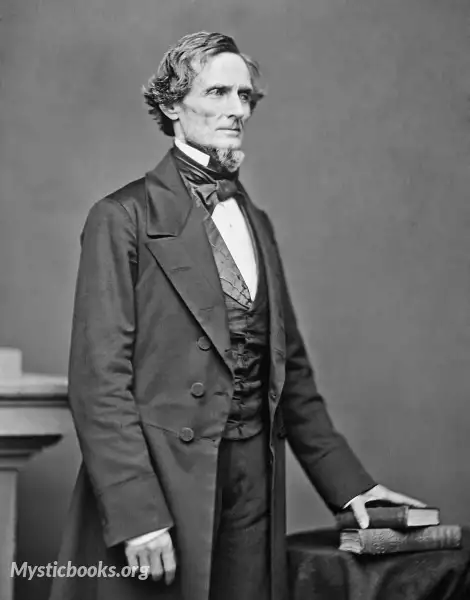
Timeline
Title
Country/Nationality
Jefferson Davis
Jefferson Finis Davis was an American politician who served as the president of the Confederate States from 1861 to 1865. As a member of the Democratic Party, he represented Mississippi in the United States Senate and the House of Representatives before the American Civil War. He previously served as the United States Secretary of War from 1853 to 1857 under President Franklin Pierce.
Davis was born in Fairview, Kentucky, to a moderately prosperous farmer, the youngest of ten children. He grew up in Wilkinson County, Mississippi, and also lived in Louisiana. His eldest brother Joseph Emory Davis secured the younger Davis's appointment to the United States Military Academy. After graduating, Jefferson Davis served six years as a lieutenant in the United States Army. He fought in the Mexican–American War as the colonel of a volunteer regiment. Before the American Civil War, he operated a large cotton plantation in Mississippi, which his brother Joseph gave him, and owned as many as 113 enslaved people. Although Davis argued against secession in 1858, he believed states had an unquestionable right to leave the Union.
Davis married Sarah Knox Taylor, daughter of general and future President Zachary Taylor, in 1835, when he was 27 years old. They were both stricken with malaria soon thereafter, and Sarah died after three months of marriage. Davis recovered slowly and suffered from recurring bouts of the disease throughout his life. At the age of 36, Davis married again, to 18-year-old Varina Howell, a native of Natchez, Mississippi, who had been educated in Philadelphia and had some family ties in the North. They had six children. Only two survived him, and only one married and had children.
Jefferson Finis Davis was born at the family homestead in Fairview, Kentucky, on June 3, 1808. He sometimes gave his year of birth as 1807. He dropped his middle name in later life, although he sometimes used a middle initial. Davis was the youngest of ten children born to Jane and Samuel Emory Davis; his oldest brother Joseph Emory Davis was 23 years his senior. He was named after then-incumbent President Thomas Jefferson, whom his father admired. In the early 20th century, the Jefferson Davis State Historic Site was established near the site of Davis's birth. Coincidentally, Abraham Lincoln was born in Hodgenville, Kentucky, only eight months later, less than 100 miles (160 km) to the northeast of Fairview.
Davis's paternal grandparents were born in the region of Snowdonia in North Wales, and immigrated separately to North America in the early 18th century. His maternal ancestors were English. After initially arriving in Philadelphia, Davis's paternal grandfather Evan settled in the colony of Georgia, which was developed chiefly along the coast. He married the widow Lydia Emory Williams, who had two sons from a previous marriage, and their son Samuel Emory Davis was born in 1756. He served in the Continental Army during the American Revolutionary War, along with his two older half-brothers. In 1783, after the war, he married Jane Cook. She was born in 1759 to William Cook and his wife Sarah Simpson in what is now Christian County, Kentucky. In 1793, the Davis family relocated to Kentucky, establishing a community named "Davisburg" on the border of Christian and Todd counties; it was eventually renamed Fairview.
After his release from prison and pardon, Davis faced continued financial pressures, as well as an unsettled family life. His elder brother Joseph died in 1870, his son William Howell Davis in 1872 and Jefferson Davis Jr. in 1878. His wife Varina was often ill or abroad, and for a time refused to live with him in Memphis, Tennessee. Davis resented having to resort to charity, and would accept only jobs befitting his former positions as U.S. Senator and Confederate President; several that he accepted proved financial failures.
Davis sought a mercantile position in Liverpool, England. However, British companies were wary, both because Britons were not interested in Canadian mines, and because Mississippi had defaulted on debts in the 1840s, and Judah Benjamin cautioned him against countering former wartime propaganda by Robert J. Walker. Davis also refused positions as head of Randolph-Macon Academy in Virginia and the University of the South in Sewanee, Tennessee, for financial reasons.
In 1869, Davis became president of the Carolina Life Insurance Company in Memphis, Tennessee, at an annual salary of $12,000 plus travel expenses, and resided at the Peabody Hotel. He recruited former Confederate officers as agents, and the board ratified his position in 1870. By 1873, he suggested that the company have boards of trustees at its various branches, and that qualification for such be that the trustee either take out a policy of at least $5,000 or own at least $1,000 in the company's stock. By midyear the Panic of 1873 affected the company, and Davis resigned when it merged with another firm over his objections. He also planned a "Davis Land Company" in which investors would pay $10 per share for 5,700 acres Davis owned in Arkansas. He drafted a prospectus that stated he owed more than $40,000 and his income did not amount to $200.
Books by Jefferson Davis

The Rise and Fall of the Confederate Government, Volume 1B
This is the story of developments that lead to the American Civil War. It was not a war over slavery; it was a war over states' rights.

The Rise and Fall of the Confederate Government, Volume 1A
The Rise and Fall of the Confederate Government (1881) is a book written by Jefferson Davis, who served as President of the Confederate States of America during the American Civil War. Davis wrote the book as a straightforward history of the Confeder...